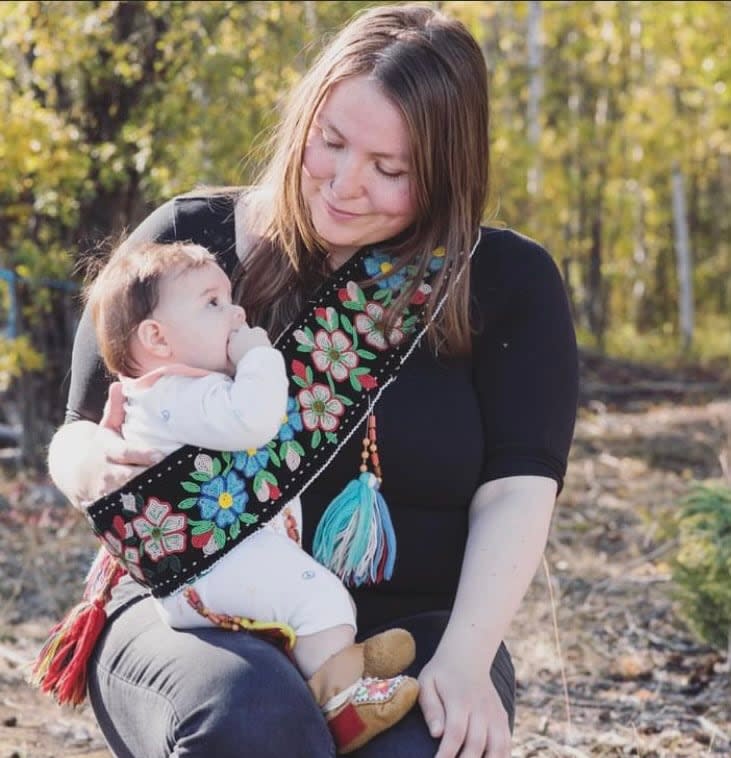Founder of Western Arctic Youth Collective honoured for work promoting culture, mental wellness
Alyssa Carpenter says it’s all about providing the sort of things she wishes were available to her, when she was growing up and sometimes struggling with her mental health.
As lead founder and project director of the Western Arctic Youth Collective (WAYC), Carpenter now works to empower Gwich’in and Inuvialuit youth in N.W.T.’s Beaufort Delta region to be change-makers. Through the collective’s cultural programming, facilitators speak openly about mental health.
It’s for this work that Pauktuutit Inuit Women of Canada recently named Carpenter as its 2024 “Young Inuk Woman of the Year.”
Carpenter says she has faced many challenges in her life, and she was particularly emotional when she received the news that she’d been honoured with the award.
“I just started crying,” she said, adding that the phone call came when she was dropping her child off at daycare.
Reaching out
Carpenter, who has studied social work at Aurora College, Yukon University and the University of Toronto, said she had initially planned to work with seniors and elders after finishing her undergraduate degree, but about six years ago, she became drawn toward supporting youth.
“The more and more I was recognizing and understanding just how trauma impacts our family … [and] the younger we get folks to understand themselves and that it’s not their fault … [then] we are able to find ourselves and heal and understand what’s happening in our community on the social level,” she said.
In 2020, Carpenter founded WAYC, a non-profit that relies on grant funding, and which now employs several people. The coalition organizes camps, gatherings and workshops based on what young people request, such as tattoo gatherings, drum-making workshops, and land-based camps. It also includes youth in the planning and execution of the programming in order to build community capacity, Carpenter said.
Through WAYC’s programming, Carpenter and the other organizers create space to talk about mental health and trauma. Carpenter also shares some of her own journey with the youth — and spoke about it in an interview with CBC News.

Carpenter, a social worker who lives in Whitehorse, says her own personal struggles in the past are what motivate her to hold space for youth to talk about mental health. (Submitted by Alyssa Carpenter)
Carpenter, who’s now based in Whitehorse, grew up between Sachs Harbour and Inuvik, N.W.T., and while she had access to learning on the land and sports in her youth, she still had struggles.
“My mental health was not great as a kid and it wasn’t great as a teenager. But like many young people, we’re really good at hiding it until you kind of reach a breaking point,” she said.
“I reached my breaking point when I was 21, when I had a plan to end my life, and not a lot of people know that,” she said.
Through this period, Carpenter said she struggled to get the support she needed, in part because she didn’t understand what was happening in her head, and because mental health wasn’t something people around her were talking about.
“We’re getting better at understanding and showing compassion and care and patience with what some of us are trying to understand about ourselves, and trying to communicate that we need help,” she said.
However, that help doesn’t always exist, especially in small communities, and that’s part of where WAYC comes in.
“When I say WAYC is the programming that I needed when I was younger, it’s having young people open up and talk about what’s going on and what they see … they’re trying to understand themselves,” she said.
Specifically, she tells young people they shouldn’t blame themselves for any traumas they may have endured.
“We’re just trying to help have those difficult conversations but also encourage them — if they need support or help, we’re there and there are people there in our community who can help them.”
Keeping WAYC running is not without its challenges, Carpenter says. Funding is a constant need and wages for the work aren’t high. But for Carpenter, her brother’s death by suicide in 2022 fuels her to continue with the work.
Connected to culture
A wide body of research shows that connection to culture and language have a positive impact on mental health, according to reports from Inuit Tapiriit Kanatami.
In a 2014 report about the social determinants of Inuit health in Canada, the association described how the ongoing impacts of colonialism, including the legacy of residential schools, have had “detrimental and irreversible effects on health and longevity.”
“The erosion of culture can adversely affect mental health and well-being, leading to depression, anxiety, substance abuse and even suicide,” it reads.
The report also cited research that showed maintaining language and cultural traditions helps Inuit foster a positive self-image and contributes to good mental health and well-being.
The positive connection between culture and mental health is why WAYC helps youth to connect with culture through its programs, Carpenter says.
In her own journey, Carpenter says there were periods where she distanced herself from her cultural practices and identity.
“That’s a big piece too, don’t let that [cultural connection] go. I let it go for a while and felt a lot of shame and I think that’s why this award was very overwhelming, is because [at one point] I felt very ashamed to be who I was,” she said.
Today, the opposite is true, and Carpenter says it’s important that she introduce herself through her family lineage: she is the daughter of Franklin Carpenter and Yvonne Nakimayak, and the granddaughter of George and Violet Doolittle, and of Frank and Florence Carpenter.
If you or someone you know is struggling, here’s where to get help:
This guide from the Centre for Addiction and Mental Health outlines how to talk about suicide with someone you’re worried about.











